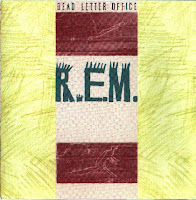
Album: R.E.M., Dead letter Office, 1987
Best Track: "Bandwagon"
Lasting Memory: Dead Letter Office features one of my all-time top-10 favorite songs, "Bandwagon." I'd actually forgotten that until yesterday, which was the first time I had listened to the album in going on 20 years. What I have never driven from my mind through either the acquisition of new knowledge or the thorough washing of gallons upon gallons of Irish whiskey and American beer is this liner note regarding the last song on DLO, "Walter's Theme"/"King of the Road":
I suppose if we had any shame we would have never allowed this little gem to see the light of day. This was recorded at the very end of a long alcohol soaked day, and I can barely remember cutting it. This first part was an attempt at writing a commercial for Walter's Bar-B-Q. The second part is King of the Road, kind of. If there was any justice in the world, Roger Miller should be able to sue for what we did to this song.R.E.M. guitarist peter Buck wrote -- even signed -- that statement included on the cassette insert by of explaning how and why the conjoined songs wound up on DLO, which was a contract-fulfilling final Island recording that cleared R.E.M. to switch labels to Warner Brothers. Buck annotated each of the outtakes and (mostly) Velvet Underground covers that make up DLO's discography, and all the notes are classics of insightful concision.
For instance, regarding "Burning Hell," Buck observed
Sometimes you write a song without even trying. Sometimes those songs are the very best ones. That's not quite the case with this one however.
Outtake from Fables of the Reconstruction.
Buck was also maybe too honest about the cover of Pylon's "Crazy":
A song by Pylon. I remember hearing their version on the radio the day that Chronic Town came out and being suddenly depressed by how much better it was than our record.As the model for delivering recorded music moves away from the use of physical media, the loss of liner notes is inevitable. When there is no longer a vinyl LP, cassette, or CD, there can no longer be a sleeve or insert that captures the identities of all the contributing musicians and whatever 1,00 words or less thoughts an artist wants to share with listeners. And that strikes me as more than shame.
Outtake from Fables of the Reconstruction.
To my way of thinking, liner notes have several advantages over Web sites, blogs, and MyFriendsterFaceSpaceBook pages. First, liner notes are permanent and frozen in time. Written in the moment and at the end of what were often long and stressful recording sessions, liner notes compelled artists to share information that would stand the test of time. But since they were written then, that information could be subject to dramatically different readings years or decades later. You know, like a book.
Liner notes also forced artists to write short and edit. Infinitely to Buck's credit, the liner notes for DLO are exactly the opposite of Fred Durst's apparently dormant blog.
The last and best thing about liner notes was that they only let listeners as far inside the artist's head and work as the artist allowed. Now that literally everything can be learned about an artist by someone with Web access and too much time to kill, there is no real distance been musicians and audiences. It has become impossible to truly idolize anyone anymore because it is inevitable you will learn that he or she had an unfortunate incident on an airplane, for instance.
I'm with Aerosmith on this one. Toys should be kept in attics.
Up Next: R.E.M., Green, 1988
No comments:
Post a Comment